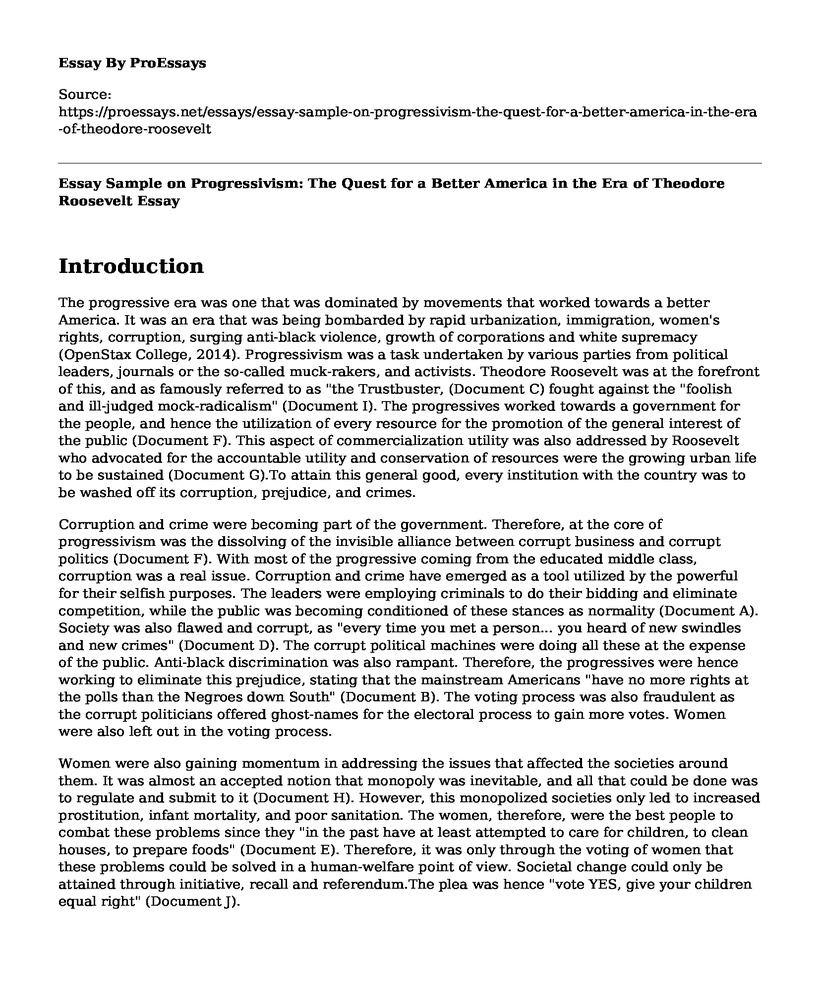Introduction
The progressive era was one that was dominated by movements that worked towards a better America. It was an era that was being bombarded by rapid urbanization, immigration, women's rights, corruption, surging anti-black violence, growth of corporations and white supremacy (OpenStax College, 2014). Progressivism was a task undertaken by various parties from political leaders, journals or the so-called muck-rakers, and activists. Theodore Roosevelt was at the forefront of this, and as famously referred to as "the Trustbuster, (Document C) fought against the "foolish and ill-judged mock-radicalism" (Document I). The progressives worked towards a government for the people, and hence the utilization of every resource for the promotion of the general interest of the public (Document F). This aspect of commercialization utility was also addressed by Roosevelt who advocated for the accountable utility and conservation of resources were the growing urban life to be sustained (Document G).To attain this general good, every institution with the country was to be washed off its corruption, prejudice, and crimes.
Corruption and crime were becoming part of the government. Therefore, at the core of progressivism was the dissolving of the invisible alliance between corrupt business and corrupt politics (Document F). With most of the progressive coming from the educated middle class, corruption was a real issue. Corruption and crime have emerged as a tool utilized by the powerful for their selfish purposes. The leaders were employing criminals to do their bidding and eliminate competition, while the public was becoming conditioned of these stances as normality (Document A). Society was also flawed and corrupt, as "every time you met a person... you heard of new swindles and new crimes" (Document D). The corrupt political machines were doing all these at the expense of the public. Anti-black discrimination was also rampant. Therefore, the progressives were hence working to eliminate this prejudice, stating that the mainstream Americans "have no more rights at the polls than the Negroes down South" (Document B). The voting process was also fraudulent as the corrupt politicians offered ghost-names for the electoral process to gain more votes. Women were also left out in the voting process.
Women were also gaining momentum in addressing the issues that affected the societies around them. It was almost an accepted notion that monopoly was inevitable, and all that could be done was to regulate and submit to it (Document H). However, this monopolized societies only led to increased prostitution, infant mortality, and poor sanitation. The women, therefore, were the best people to combat these problems since they "in the past have at least attempted to care for children, to clean houses, to prepare foods" (Document E). Therefore, it was only through the voting of women that these problems could be solved in a human-welfare point of view. Societal change could only be attained through initiative, recall and referendum.The plea was hence "vote YES, give your children equal right" (Document J).
References
OpenStax College (2014). U.S History. Leading the Way: The Progressive Movement, 1890-1920. Chapter 21 Pp. 609-6287. Retrieved from http://www.sweethaven02.com/openstax/USHistory-LR.pdf
Cite this page
Essay Sample on Progressivism: The Quest for a Better America in the Era of Theodore Roosevelt. (2023, Jan 03). Retrieved from https://proessays.net/essays/essay-sample-on-progressivism-the-quest-for-a-better-america-in-the-era-of-theodore-roosevelt
If you are the original author of this essay and no longer wish to have it published on the ProEssays website, please click below to request its removal:
- Historical Figure: Elizabeth Cady Stanton Essay
- Pepys's Diaries Essay Example
- Essay Sample on 19th-Century Americans: Worries Over Volatility, Slavery, and Legacy
- Essay Example on Ancient Egyptians: Quarrying & Technologies Behind the Pyramids
- African Americans: From Captivity to Freedom - Research Paper
- Roman Republic: From Conquest to Effective Policy - Essay Sample
- Artifacts/Expressions of Popular Culture - Article Review Example







